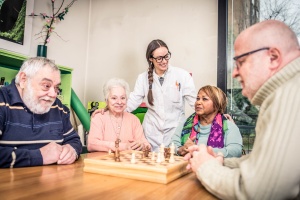
The SENSE-Cog trial points out the critical importance of addressing both hearing and vision health in people with dementia. It shows that taking care of hearing and vision problems can improve their quality of life, at least in the short term.
The research was a randomized controlled trial, which means participants were randomly assigned to either receive the intervention or not. It included people with mild to moderate dementia from five different European countries: Cyprus, France, Greece, Ireland, and the UK. The main goal was to see how much a special program called Sensory Support Intervention (SSI), which focused on improving hearing and vision, could affect the quality of life and other health outcomes in people struggling with dementia and sensory issues.
The intervention results showed that participants’ quality of life improved in the short term after receiving the hearing and vision rehabilitation. However, over the longer term, the difference between those who got the intervention and those who didn’t became less noticeable, suggesting that further research is needed. The study also emphasized that hearing and vision problems are common in people with dementia, with up to 70% of them experiencing these issues. If these problems aren’t addressed, they can worsen dementia symptoms and reduce overall well-being.
There have been very few studies like this that look at non-drug treatments for dementia, especially across different countries with varying languages and healthcare systems. As Europe gets ready to introduce new treatments that target amyloid (a protein associated with Alzheimer’s disease), the study’s findings remind us that non-drug interventions remain important, especially for people with more advanced stages of dementia or types of dementia other than Alzheimer’s, who might not benefit from these new treatments.
The lead researcher, Professor Iracema Leroi from Trinity College Dublin, explained that the results are promising because they show that simple, low-cost interventions like providing hearing aids or glasses could improve the quality of life for people with dementia. Leroi believes that these kinds of non-drug treatments should continue to be studied and supported as important areas of dementia care.
Additionally, Leroi stressed the need to focus on the quality of life for people living with dementia. With so much attention being given to treatments that try to prevent or slow down dementia, she highlighted the importance of also focusing on helping the 55 million people who already have dementia to live well.
Professor Brian Lawlor, also from Trinity College Dublin, added that hearing and vision problems are a big issue for people with dementia that often goes unnoticed. He noted that this study was the first large-scale attempt to see if improving hearing and vision could make a difference in the lives of people with dementia. The fact that it was possible to run this study even during the COVID-19 pandemic shows how much potential this type of intervention has. Lawlor emphasized that the early signs of improved quality of life suggest that more research is needed.
This study provides the best evidence so far that these interventions can improve their quality of life in the short term. However, the research team believes that more evidence is needed to understand the effects on other important factors like cognition, behavior, and the role of family caregivers.
The study calls for ongoing efforts to develop and improve non-drug treatments that address the complex needs of people with dementia. It suggests a more holistic approach to their care is necessary to support their well-being.